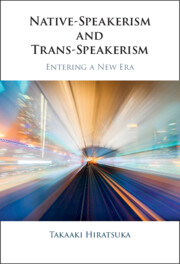Book contents
- Native-Speakerism and Trans-Speakerism
- Native-Speakerism and Trans-Speakerism
- Copyright page
- Contents
- Figures
- Tables
- 1 Introduction: Where It All Began
- 2 Well-Trodden Path: Native-Speakerism
- 3 Untrodden Path: Trans-Speakerism
- 4 Voices of Secondary School Teachers
- 5 Voices of Graduate School Students
- 6 Voices of University Professors
- 7 Conclusion: Where It All Begins (Again)
- References
- Index
2 - Well-Trodden Path: Native-Speakerism
Published online by Cambridge University Press: 31 August 2024
- Native-Speakerism and Trans-Speakerism
- Native-Speakerism and Trans-Speakerism
- Copyright page
- Contents
- Figures
- Tables
- 1 Introduction: Where It All Began
- 2 Well-Trodden Path: Native-Speakerism
- 3 Untrodden Path: Trans-Speakerism
- 4 Voices of Secondary School Teachers
- 5 Voices of Graduate School Students
- 6 Voices of University Professors
- 7 Conclusion: Where It All Begins (Again)
- References
- Index
Summary
This chapter describes the origin, development, and subsequent conceptualization of native-speakerism, as well as profiling relevant research on it. Importantly, it also offers my own understanding and interpretation about the notion. To do this, the chapter presents a selection of previous discussions and empirical research into native-speakerism and documents some of the most deleterious effects that native-speakerism has had on the lives and identities of both NESTs and NNESTs worldwide – specifically the effects on NNES teachers and researchers in Japan, who are the focal points of this book. I commence this chapter with a theoretical overview of the ways in which native-speakerism came to be recognized and defined. I then introduce my own analysis of what native-speakerism entails at this moment in time within the ELT field. Afterward, I provide an overview of germane conceptual and empirical studies on native-speakerism while offering my own critiques of them as I do so. With the key points and positionings of the discussion established, I conclude this chapter by positing my case for the originality and significance of this endeavor and by presenting the focal research questions which the research within this volume attempts to answer.
- Type
- Chapter
- Information
- Native-Speakerism and Trans-SpeakerismEntering a New Era, pp. 16 - 43Publisher: Cambridge University PressPrint publication year: 2024

